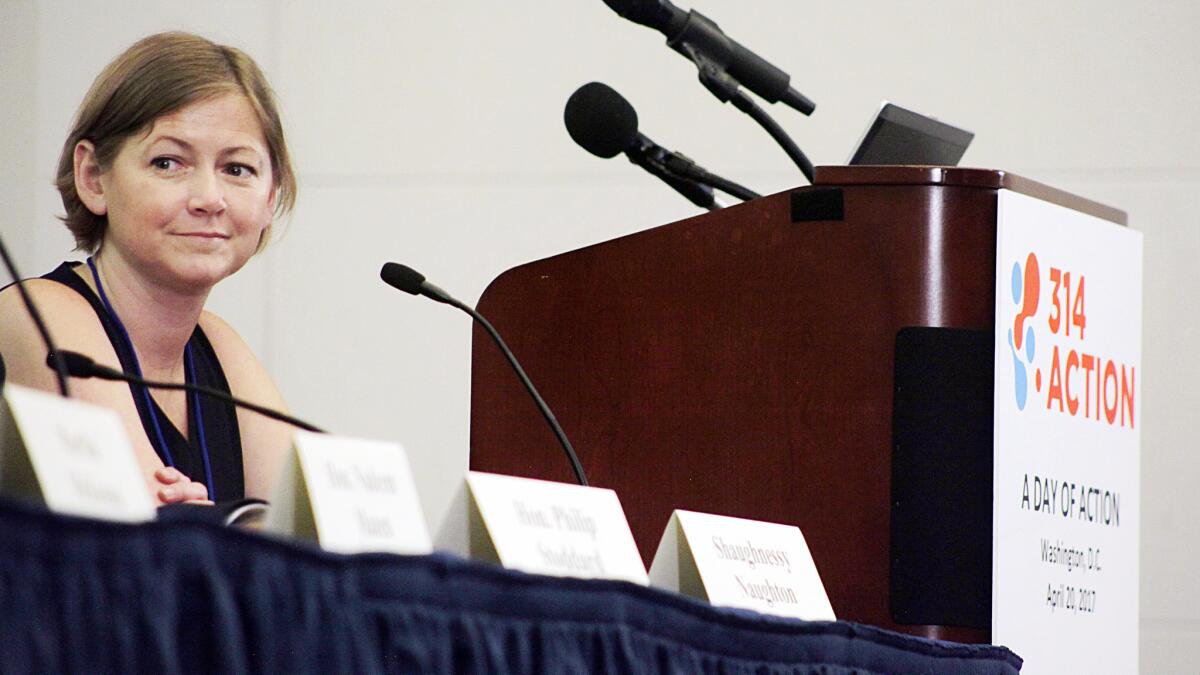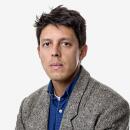Q&A: ‘It’s important to have scientific voices heard at all levels of government’
- Share via
Few people understand the challenges scientists face when they run for office as well as Shaughnessy Naughton. She has done it herself not once but twice.
In 2014 and again in 2016, Naughton campaigned for a congressional seat in eastern Pennsylvania, touting her experience as a researcher who helped develop drugs for
Neither of Naughton’s campaigns got very far; she lost both times in the Democratic primary. But she found that scientists rallied behind her candidacy. So she switched gears and founded 314 Action to help elect candidates with backgrounds in science, engineering, technology and math.
The Times caught up with Naughton during a recent visit to Orange County to talk about the growing interest in mixing science with politics.
What is the 314 Action’s mission?
To elect more people with scientific and technical backgrounds to public office at all levels of government.
Why is that important?
Right now there really is a dearth of people with scientific and technical backgrounds at all levels of government. We see that reflected in priorities in legislation and the failure to act on climate change. That would change if we had more technically minded people in office.
What happens when scientists leave their labs to experiment with politics? »
Science isn't just good for scientists. We all benefit from clean air and clean water and medical advancements and new technology. We only get that by having quality education and a federal government that is invested our future. That means science and technology.
What are some of the key issues for your group?
We would certainly like to see action on climate change. I don't think it is an exaggeration to call it an existential threat, and right now we have politicians that are denying that it is even happening.
That is a missed opportunity for us as a nation to take the lead in a low-carbon future. It’s also reckless for the future for our kids and our country.
Let’s be honest — is all this really all about Trump ?
The attacks on science certainly didn't start with President Trump. But his election has been a catalyst for the scientific community to step up and get involved. People realize they need to go beyond just advocacy and actually get involved in electoral politics.
Do scientists seem eager to get into politics?
We have had thousands of scientists across the country put their hand up to say they are interested in running for public office.
How do you help them with that?
What we try to do is give them a peek behind the curtain of what’s actually involved.
It can be very hard to break in when you don't come from a traditional political background. What we are trying to do is help navigate the process.
Science isn't just good for scientists. We all benefit from clean air and clean water and medical advancements and new technology.
— 314 Action founder Shaughnessy Naughton

Why do you suppose scientists have been reluctant to run for office in the past?
Traditionally, the scientific community has looked at politics as dirty and science as pure. They felt that any dabbling into politics could somehow pollute them.
Our argument is that what is polluting the process are congressmen like [Rep. Dana] Rohrabacher who take an openly hostile approach to science and yet serve on the House Committee on Science and Technology.
Are you specifically focused on getting scientists elected to Congress?
There is a lot of interest at the Congressional level because so many important decisions are being made there. But that is a tough place to start. That is not dipping your toe in the pool — that’s jumping all-in.
We think it’s important to have scientific voices heard at all levels of government. So we work with the candidates to see where it’s going to make the most sense for them to run as far as their position in their life and their family and career.
What is 314 Action’s strategy in Southern California?
We think there is a lot of opportunity in Orange County in particular, so we are really excited to see the amount of local activism and these candidates stepping forward.
You lost two congressional campaigns. What did that experience teach you?
We don't have many people with scientific backgrounds in Congress, which is why I founded 314.
As a scientist, was there anything you found alienating about getting in politics?
Getting fashion advice from 60-year-old men. When I first ran, one of the senior Democratic officials in our local party sat me down and said, “Well, you know you need to stop wearing skirts and you should cut your hair and start wearing pearls and make yourself look more frumpy.”
I think that is kind of a larger statement as far as the challenges women have getting into politics. But there’s also the feeling you sometimes get from the party of, “Oh, I love that you are different — now go look like everybody else.”
Did you learn anything from that?
People appreciate authenticity. That is what we are really seeing from our candidates — people who didn't plan out a career in politics but are so motivated and outraged by what’s going on both in Washington and at a more local level that they feel the need to take this huge step into public life. I think that is something that is really going to resonate with voters.
This interview has been edited for length and clarity.
Twitter: jpanzar
MORE IN SCIENCE
A new take on political science: Training researchers to run for office
This new technique could change the future of biodiesel
Chinese satellite breaks a quantum physics record, beams entangled photons from space to Earth




